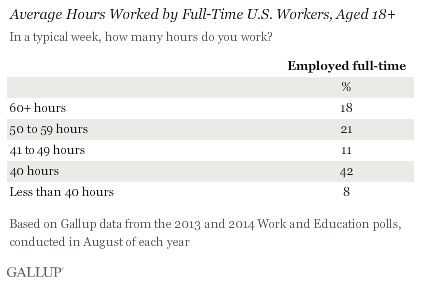Your #Career : Feel Like You’re Always Working? That’s Because You Are…And If it’s Not Enough that We’re Working More than Generations Past, Many People are Also Getting Paid Less, comparatively, as Well.
One of the Benefits of Living in ‘The Future’ is that Technology was Going to be Doing All the Hard Work. It’s why The Jetsons had that robot servant, and why Roombas were invented. But even though we live in a time with actual, functional hoverboards and self-driving cars, people are still putting in considerable hours at work. More hours, in fact, than our grandparents did.
Looking at Gallup poll numbers from last year, full-time workers in the U.S. are working longer than 40 hours on average — 47, to be exact. To put that in perspective, that’s practically one more entire working day added to the weekly slate. A quick look at Gallup’s numbers reveal even further surprises, such as the fact only half of respondents reported working 40 hours or less. That means half of the country is working more than the standard 9-5 on a weekly basis.

In some industries, this is relatively common. We’ve all heard the horror stories from Wall Street, or even the tales of Silicon Valley entrepreneurs spending 80 or more hours toiling away. But there’s always been a quiet assumption that most people were putting in their 40 hours, and then heading home. This poll shows that clearly isn’t the case. It’s also interesting to note that in a time where there is a good deal of rhetoric surrounding how lazy Americans can be, Gallup’s findings actively refute that notion.
Take, for example, Republican presidential contender Jeb Bush’s recent comments regarding the American work ethic: “We have to be a lot more productive, workforce participation has to rise from its all-time modern lows,” Bush said during an interview with New Hampshire’s The Union Leader. “It means that people need to work longer hours and, through their productivity, gain more income for their families. That’s the only way we’re going to get out of this rut that we’re in.”
Like this Article ?…Share It ! You now can easily enjoy/follow/share Today our Award Winning Articles/Blogs with Now Over 300K+ Growing Participates Worldwide in our various Social Media formats below:
FSC LinkedIn Network: www.linkedin.com/in/frankfsc/en
- Facebook: http://www.facebook.com/pages/First-Sun-Consulting-LLC-Outplacement-Services/213542315355343?sk=wall
- Twitter: Follow us @ firstsunllc
educate/collaborate/network….Look forward to your Participation !
continue of article:
And if it’s not enough that we’re working more than generations past, many people are also getting paid less, comparatively, as well.
To explain the findings, Gallup says there are a few things at play: “personal gumption” and pay structure among them. Overtime laws and the Affordable Care Act have a clear impact on weekly hours for many workers, and as a result, some people have had to snag up more than one position. That’s another thing that may have skewed the numbers — some Americans, who are now scheduled for 25 hours per week so that employers can dodge health care and benefit thresholds, are getting other jobs that schedule them for, say, 20 or 15 hours per week. That can add up to more than 40, in many cases.
So, it may be fair to look at certain regulatory frameworks to see why Americans are working so many hours, when you might suspect that they’d be working less at this point in time.
Cheatsheet.com | August 24, 2015 | Sam Becker



